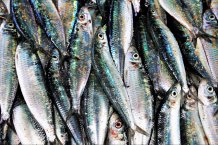Articles

Fish at a fish market
Overfishing plus climate change equals threat to fisheries
Overfishing increases the threat posed by climate change to fish stocks and fisheries, according to a new report for MPs.
Catch limits for more than 30% of UK and EU fish stocks have “repeatedly been set at unsustainable levels”, the report warns.
It says such overfishing reduces “resilience” – the ability of fish to withstand and recover from other threats, including climate change.
Climate change is causing ocean warming, acidification and reduced oxygen levels – affecting the health and survival of fish and the prey on which they depend.
James Stewart, a PhD student at the University of Exeter, produced the document during a policy fellowship at the Parliamentary Office of Science and Technology, which provides independent analysis to MPs and other policymakers.
“I worked with industry, scientists and MPs while preparing this report,” said Stewart.
“It was encouraging to see MPs engaging with the science, and scientists willing and able to influence policy.
“It’s a great example of how collaborative science, including some of the excellent marine research here in Exeter, can feed into policy decisions.”
The report includes a range of options that might help protect fish stocks:
- Engage in fisheries monitoring and management that accounts for the effects of climate change
- Adapt gear and methods to limit “bycatch” (accidental catching of other species)
- Proactive, international management of fisheries to prevent overfishing as fish stocks move around
- Independent brokers to negotiate joint management by fishers, policymakers and scientists
- UK aquaculture could diversify to farm warm-water species like sea bass
- Realigning management and incentives to support more sustainable fishing methods
- Well-designed and evaluated protected areas may buffer fish against climate change and overfishing
Climate change is affecting fish numbers and distribution (where they can be found), but the report says uncertainty about the commercial impact on fisheries is hampering efforts to respond.
“Improving fisheries’ management and preventing overfishing will help maintain their long-term productivity,” it says.
Date: 8 July 2019
